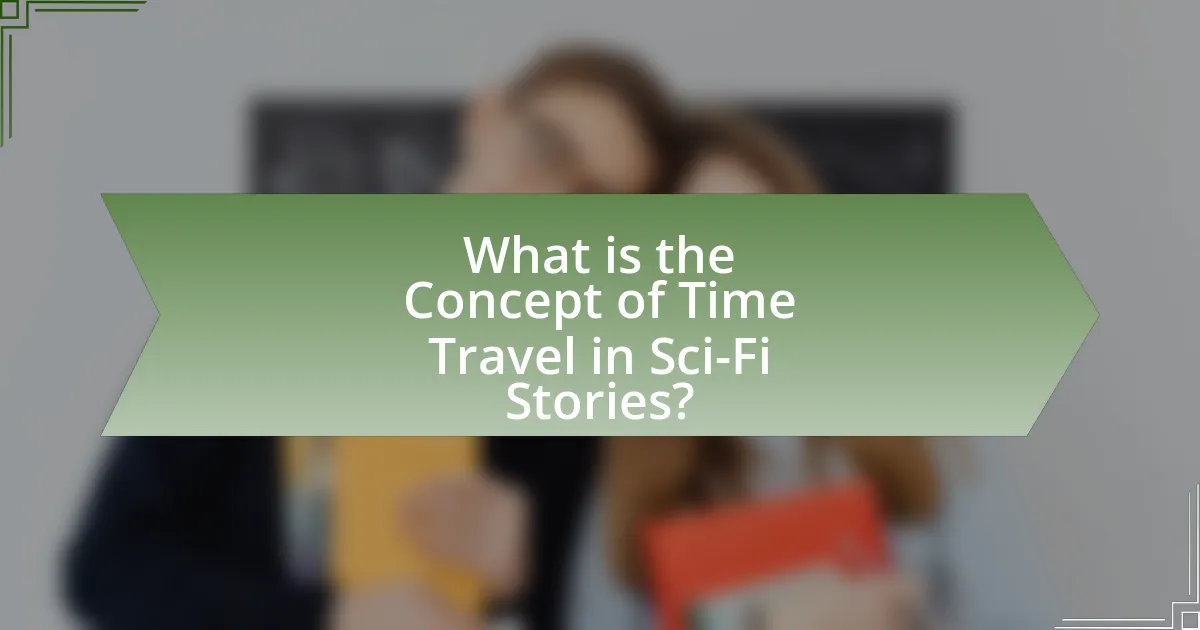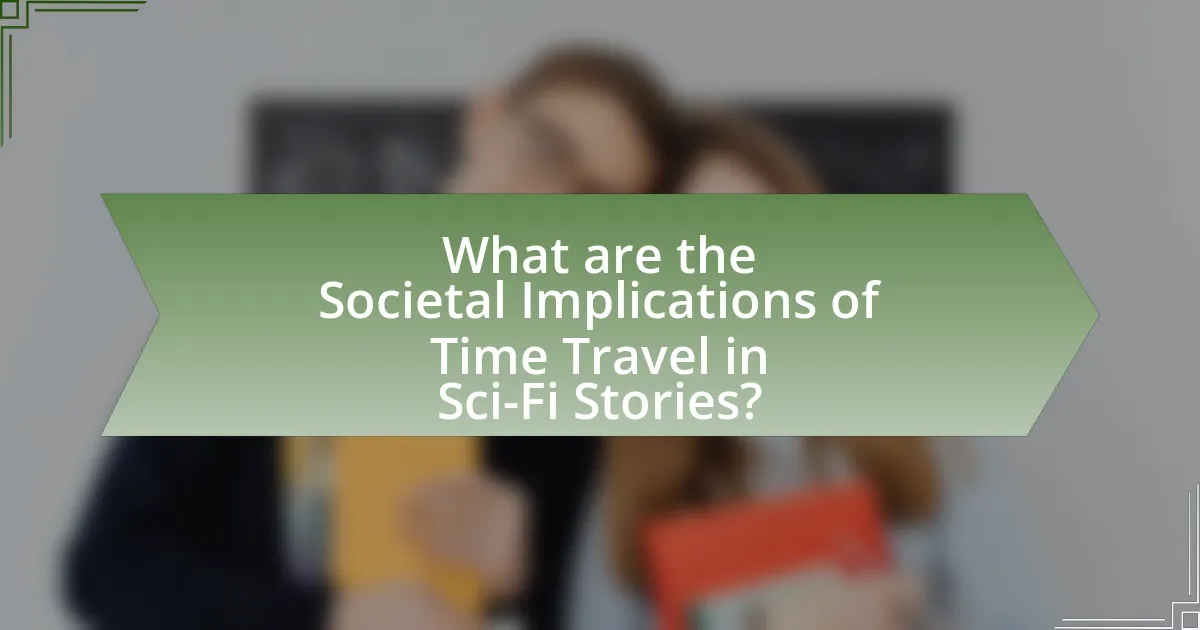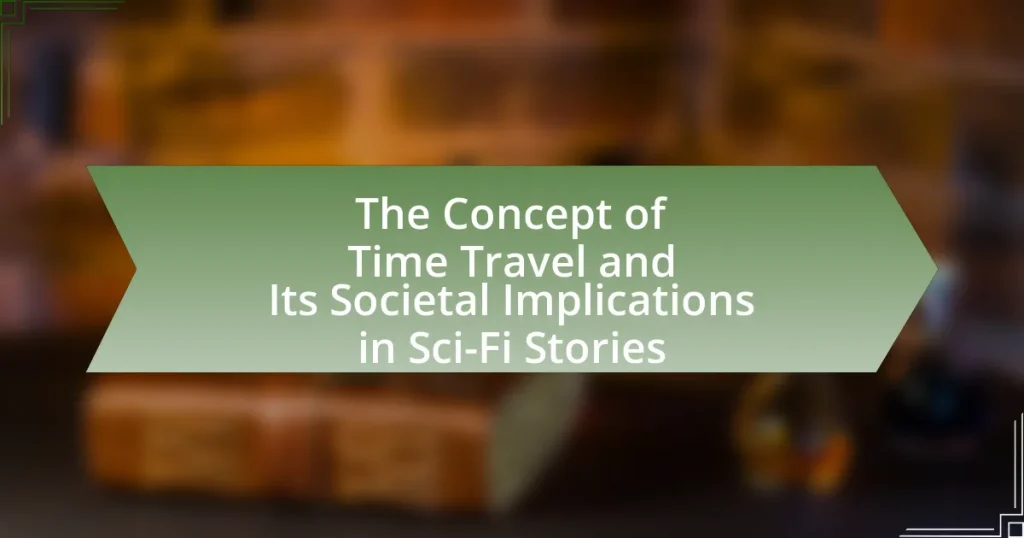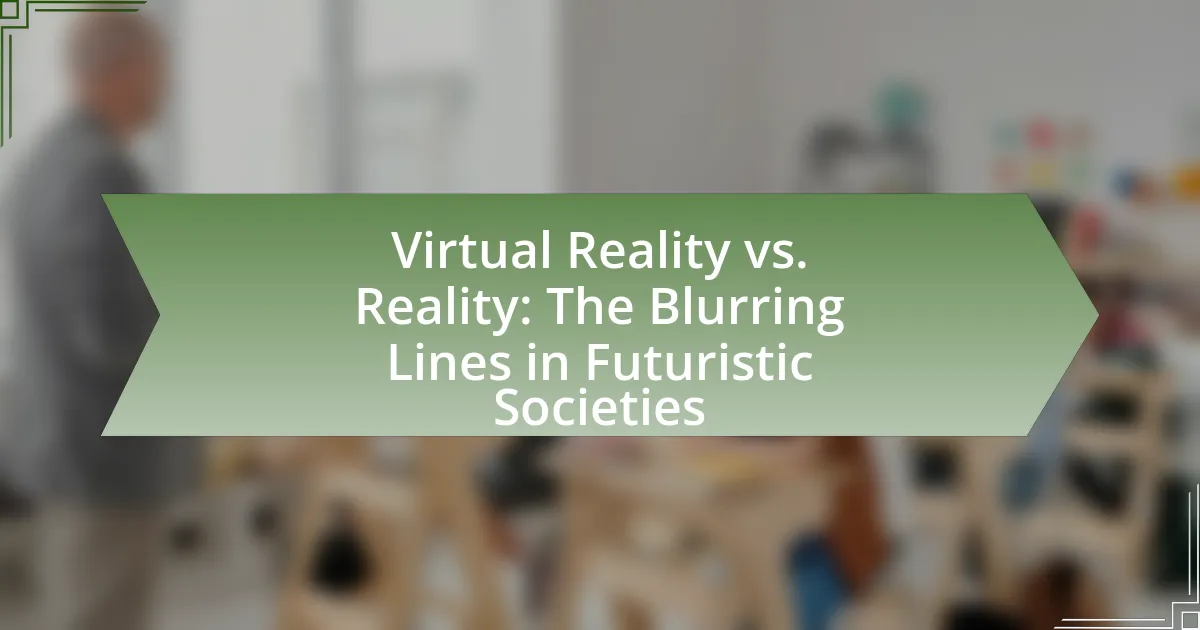The article explores the concept of time travel in science fiction stories, examining its portrayal, mechanisms, and societal implications. It discusses how time travel allows characters to navigate different points in time, leading to complex narratives that address themes of causality, free will, and ethical dilemmas. Notable examples from literature and film, such as H.G. Wells’ “The Time Machine” and “Back to the Future,” illustrate the diverse interpretations of time travel and its impact on characters and their relationships. The article also highlights the philosophical questions raised by time travel, including the moral responsibilities associated with altering history and the potential consequences for society.

What is the Concept of Time Travel in Sci-Fi Stories?
The concept of time travel in sci-fi stories involves the ability to move between different points in time, often through technological means or supernatural phenomena. This narrative device allows characters to explore past events, alter historical outcomes, or glimpse into the future, creating complex plots that examine the consequences of such actions. Notable examples include H.G. Wells’ “The Time Machine,” which introduces the idea of a time-traveling device, and films like “Back to the Future,” which illustrate the potential paradoxes and ethical dilemmas associated with altering time. These stories often reflect societal concerns about fate, free will, and the impact of technology on human life.
How is time travel typically portrayed in science fiction?
Time travel is typically portrayed in science fiction as a mechanism that allows characters to move between different points in time, often leading to complex interactions with past or future events. This portrayal frequently includes themes of paradoxes, such as the grandfather paradox, where actions in the past can alter the present or future. Notable examples include H.G. Wells’ “The Time Machine,” which explores the consequences of time travel on society and evolution, and films like “Back to the Future,” which emphasize the personal and societal ramifications of altering timelines. These narratives often reflect societal concerns about technology, fate, and the nature of time itself, illustrating how time travel serves as a narrative device to explore human experiences and ethical dilemmas.
What are the common mechanisms of time travel in these narratives?
Common mechanisms of time travel in narratives include time machines, wormholes, and time loops. Time machines, such as the TARDIS in “Doctor Who,” allow characters to travel to different points in time through advanced technology. Wormholes, often depicted in films like “Interstellar,” serve as shortcuts through spacetime, enabling instantaneous travel between distant times. Time loops, illustrated in stories like “Groundhog Day,” involve characters reliving the same period repeatedly, often leading to personal growth or change. These mechanisms reflect societal themes of causality, fate, and the consequences of altering the past.
How do different authors interpret the concept of time travel?
Different authors interpret the concept of time travel in various ways, often reflecting their unique philosophical, scientific, and narrative perspectives. For instance, H.G. Wells in “The Time Machine” presents time travel as a physical journey through time, exploring social evolution and class disparity. In contrast, Kurt Vonnegut’s “Slaughterhouse-Five” portrays time travel as a non-linear experience, emphasizing the inevitability of fate and the trauma of war. Additionally, in “11/22/63,” Stephen King examines time travel as a means to alter historical events, raising ethical questions about the consequences of changing the past. These interpretations highlight the diverse thematic explorations of time travel, from social critique to existential reflection, showcasing its versatility in science fiction literature.
Why is time travel a popular theme in science fiction?
Time travel is a popular theme in science fiction because it allows exploration of complex concepts such as causality, alternate realities, and the nature of time itself. This theme captivates audiences by presenting scenarios where characters can alter past events or glimpse future possibilities, leading to profound moral and philosophical questions. Notable examples include H.G. Wells’ “The Time Machine,” which introduced the idea of time as a dimension that can be navigated, and films like “Back to the Future,” which illustrate the consequences of changing historical events. These narratives engage viewers by challenging their understanding of time and its implications on human existence.
What philosophical questions does time travel raise?
Time travel raises significant philosophical questions regarding causality, free will, and the nature of time itself. One major question is whether altering past events can change the present, which challenges the concept of determinism. Additionally, time travel prompts inquiries about the moral implications of changing historical events, such as the potential to prevent tragedies or alter personal destinies. The paradoxes associated with time travel, such as the grandfather paradox, further complicate our understanding of identity and existence. These questions highlight the intricate relationship between time, choice, and consequence, making time travel a profound topic in philosophical discourse.
How does time travel allow for exploration of alternate realities?
Time travel allows for exploration of alternate realities by enabling individuals to access different timelines that diverge from the original. In many sci-fi narratives, such as in the works of H.G. Wells and the “Back to the Future” series, characters can travel to points in time where choices or events have led to different outcomes, creating parallel universes. This concept is supported by the many-worlds interpretation of quantum mechanics, which posits that every decision spawns a new universe, thus providing a framework for the existence of alternate realities.

What are the Societal Implications of Time Travel in Sci-Fi Stories?
The societal implications of time travel in sci-fi stories often explore themes of morality, ethics, and the consequences of altering history. These narratives frequently depict how individuals or societies grapple with the potential to change past events, leading to discussions about responsibility and the unpredictability of outcomes. For instance, in stories like “Back to the Future,” characters face dilemmas regarding their actions’ impact on their present and future, illustrating the ripple effects of seemingly small changes. Additionally, time travel narratives often reflect societal anxieties about technology and control, as seen in works like “The Time Machine” by H.G. Wells, which critiques social stratification and the consequences of unchecked progress. Such stories serve as cautionary tales, prompting audiences to consider the ethical ramifications of their choices and the interconnectedness of time and society.
How does time travel affect characters and their relationships?
Time travel significantly alters characters and their relationships by introducing complexities such as altered timelines, emotional conflicts, and the potential for paradoxes. Characters may experience changes in their relationships due to interactions with past or future versions of themselves or others, leading to misunderstandings or emotional turmoil. For example, in “Back to the Future,” Marty McFly’s actions in the past directly impact his family’s dynamics, showcasing how time travel can reshape personal connections. Additionally, time travel can create scenarios where characters must confront their past decisions, as seen in “Doctor Who,” where the Doctor’s interactions with companions often lead to profound emotional consequences. These narrative elements illustrate that time travel serves as a catalyst for character development and relationship evolution, emphasizing the intricate interplay between time and personal connections.
What are the emotional consequences of altering past events?
Altering past events can lead to significant emotional consequences, including regret, anxiety, and a distorted sense of identity. When individuals contemplate changes to their past, they often experience regret over missed opportunities or decisions made, which can result in persistent feelings of sadness or dissatisfaction. Additionally, anxiety may arise from the uncertainty of how these alterations could impact their present and future, creating a sense of instability. This emotional turmoil can further complicate one’s identity, as individuals may struggle to reconcile their current self with the potential versions of themselves that could have emerged from different past choices. Research in psychology indicates that such cognitive dissonance can lead to increased stress and emotional distress, highlighting the profound impact of perceived control over one’s past on mental well-being.
How do time travel narratives explore themes of loss and redemption?
Time travel narratives explore themes of loss and redemption by allowing characters to confront their past mistakes and the consequences of their actions. These stories often depict protagonists who travel back in time to prevent a tragedy or to reclaim lost relationships, illustrating the emotional weight of their choices. For instance, in “The Time Traveler’s Wife,” the protagonist’s ability to time travel leads to profound loss, as he cannot control when he disappears, ultimately affecting his loved ones. This narrative structure emphasizes the idea that redemption is often intertwined with the acceptance of loss, as characters must learn to cope with their past while seeking to make amends. The exploration of these themes highlights the human desire for second chances and the complexity of emotional healing in the face of irreversible events.
What ethical dilemmas arise from the concept of time travel?
The ethical dilemmas arising from the concept of time travel include the potential for altering historical events, which could lead to unintended consequences and moral responsibility for those changes. For instance, if an individual travels back in time and prevents a significant event, such as a war or a disaster, the ramifications could reshape the present in unpredictable ways, raising questions about the morality of intervening in history. Additionally, time travel poses dilemmas regarding consent, as individuals may be affected by changes without their knowledge or agreement. The concept also introduces issues of inequality, where only certain individuals may have access to time travel, potentially leading to exploitation or manipulation of historical events for personal gain. These dilemmas highlight the complex interplay between free will, responsibility, and the consequences of one’s actions across time.
How do characters grapple with the consequences of their actions across time?
Characters grapple with the consequences of their actions across time by experiencing regret, altered realities, and moral dilemmas. In many sci-fi narratives, such as “Back to the Future” and “The Butterfly Effect,” characters face immediate repercussions from their decisions, which can lead to unintended outcomes in their present or future. For instance, in “The Butterfly Effect,” the protagonist discovers that even small changes in the past can drastically alter his life and the lives of others, illustrating the complexity of cause and effect over time. This struggle often manifests as a quest for redemption or a desire to correct past mistakes, highlighting the emotional and ethical weight of their choices.
What moral questions does time travel pose for society as a whole?
Time travel poses significant moral questions for society, primarily concerning the implications of altering past events. The ability to change historical outcomes raises ethical dilemmas about responsibility and the potential consequences of such actions. For instance, if an individual were to prevent a tragedy, the moral question arises: would the benefits of such an action outweigh the unforeseen negative consequences that could emerge from altering the timeline?
Additionally, time travel introduces issues of free will versus determinism. If individuals can change their past, it challenges the notion of fate and the moral responsibility associated with choices made in the present. This is exemplified in various sci-fi narratives, such as “Back to the Future,” where characters grapple with the repercussions of their actions on future generations.
Moreover, the concept of time travel raises questions about justice and accountability. If someone were to commit a crime and then travel back in time to avoid consequences, it challenges societal norms regarding punishment and rehabilitation. This scenario highlights the potential for exploitation of time travel for personal gain, further complicating moral considerations.
In summary, time travel presents complex moral questions regarding the ethics of altering history, the nature of free will, and the implications for justice, all of which have profound societal implications.

How do Different Sci-Fi Stories Approach Time Travel?
Different sci-fi stories approach time travel through various mechanisms and implications, often reflecting societal concerns and philosophical questions. For instance, in H.G. Wells’ “The Time Machine,” time travel is depicted as a physical journey through time, allowing exploration of future societies and their evolution, which critiques social class disparities. In contrast, “Back to the Future” utilizes a time machine as a vehicle for adventure, emphasizing personal choices and their consequences, showcasing the butterfly effect. Additionally, in “Doctor Who,” time travel is portrayed as a means to explore historical events and moral dilemmas, highlighting the ethical implications of altering the past. These diverse approaches illustrate how time travel serves as a narrative device to explore complex themes such as morality, societal structure, and the nature of time itself.
What are some notable examples of time travel in literature and film?
Notable examples of time travel in literature and film include “The Time Machine” by H.G. Wells, which introduced the concept of a machine that allows travel through time, and the film “Back to the Future,” where characters use a DeLorean car to navigate different time periods. Additionally, “Doctor Who,” a long-running television series, features the TARDIS, a time-traveling spaceship, exploring various historical and future events. These works illustrate the diverse interpretations of time travel and its implications on society, such as altering history or confronting future consequences.
How do classic works differ from contemporary interpretations of time travel?
Classic works of time travel, such as H.G. Wells’ “The Time Machine,” often focus on the philosophical and moral implications of time travel, emphasizing the consequences of altering history and the nature of time itself. In contrast, contemporary interpretations, like those seen in “Doctor Who” or “Avengers: Endgame,” frequently prioritize entertainment and complex narratives, incorporating advanced technology and multiverse theories, while often downplaying the ethical dilemmas associated with time travel. This shift reflects a broader societal fascination with technology and the potential for alternate realities, showcasing how cultural contexts influence storytelling in the genre.
What unique perspectives do various cultures bring to time travel narratives?
Various cultures contribute distinct perspectives to time travel narratives, reflecting their unique historical, philosophical, and social contexts. For instance, Indigenous cultures often emphasize cyclical time, viewing time as a series of interconnected events rather than a linear progression, which influences narratives to focus on the importance of ancestral knowledge and the impact of past actions on the present. In contrast, Western cultures typically portray time as linear, leading to narratives that explore themes of progress, causality, and individual agency, as seen in works like H.G. Wells’ “The Time Machine.” Additionally, Eastern philosophies, such as those found in Hinduism and Buddhism, introduce concepts of karma and reincarnation, which shape time travel stories to explore moral consequences and the interconnectedness of all beings across time. These cultural perspectives enrich time travel narratives by providing diverse frameworks for understanding time, existence, and the implications of altering past events.
What lessons can we learn from time travel stories?
Time travel stories teach us about the consequences of our actions and the importance of choices. These narratives often illustrate how altering past events can lead to unforeseen repercussions, emphasizing the interconnectedness of time and the complexity of causality. For example, in H.G. Wells’ “The Time Machine,” the protagonist’s journey into the future reveals the long-term effects of societal neglect, highlighting the need for responsible decision-making in the present. Additionally, time travel stories frequently explore themes of regret and redemption, as characters confront their past mistakes and seek to make amends, reinforcing the idea that understanding history is crucial for personal growth and societal progress.
How can time travel narratives inform our understanding of history and progress?
Time travel narratives can inform our understanding of history and progress by allowing audiences to explore alternative outcomes and the consequences of historical events. These narratives often depict characters who travel to pivotal moments in time, illustrating how small changes can lead to significant shifts in societal development, as seen in works like “The Time Machine” by H.G. Wells, which critiques social class disparities. Additionally, time travel stories encourage reflection on the moral implications of historical actions, as demonstrated in “11/22/63” by Stephen King, where the protagonist grapples with the ethical dilemmas of altering past events. By engaging with these themes, time travel narratives provide a framework for analyzing the complexities of history and the potential for progress or regression in society.
What practical insights can we gain from the societal implications of time travel in fiction?
The societal implications of time travel in fiction provide practical insights into human behavior, ethics, and the consequences of choices. For instance, narratives like “The Time Machine” by H.G. Wells illustrate the potential for societal stratification and the impact of technological advancement on human evolution. These stories often reflect contemporary anxieties about social inequality and the future, prompting readers to consider the moral responsibilities tied to innovation. Additionally, works such as “Back to the Future” explore the butterfly effect, emphasizing how small actions can lead to significant changes in society, thereby encouraging critical thinking about personal responsibility and the interconnectedness of actions. Such fictional explorations serve as cautionary tales, urging society to reflect on its trajectory and the ethical implications of its decisions.




